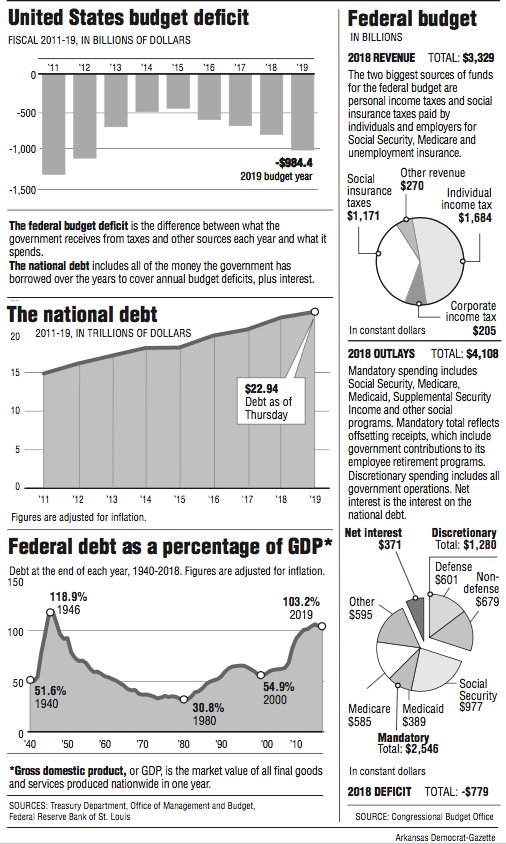WASHINGTON -- The federal deficit for the 2019 budget year surged to $984.4 billion, its highest point in seven years, and is widely expected to top the $1 trillion mark in coming years.
The 26% surge from the 2018 deficit of $779 billion that the government reported Friday reflected such factors as revenue lost from the 2017 Trump tax cut and a budget deal that added billions in spending for military and domestic programs.
Forecasts by the Trump administration and the Congressional Budget Office project that the deficit will top $1 trillion in the current budget year, which began Oct. 1. And the budget office is estimating that the annual deficit will stay above the $1 trillion mark over the next decade.
Those projections stand in contrast to President Donald Trump's campaign promises that even with revenue lost initially from his tax cuts, he would be able to eliminate the federal budget deficit with cuts in spending and increased growth generated by the tax cuts. Tax revenue for the last two years has fallen more than $400 billion short of what the budget office projected in June 2017, six months before the tax law was passed.
For the 12-month period, spending rose 8.2%, the most since 2009, totaling $4.45 trillion on increased outlays for the military, health care and education. Revenue advanced 4% to $3.46 trillion. For September alone, the surplus was $82.8 billion, compared with $119.1 billion a year earlier.
The fiscal 2019 deficit came in just under the $1 trillion wire, but that was largely the result of Trump's tariffs, which brought in more than $70 billion in revenue. The customs-duties revenue represented a 71% increase from 2018, as American companies paid more at the border for Chinese imports, steel and other goods.
Treasury Secretary Steven Mnuchin asserted that Trump's economic program was nevertheless working, with unemployment at its lowest point in nearly 50 years. Mnuchin argued that to put the budget on a sustainable path, Congress must enact proposals "to cut wasteful and irresponsible spending."
So far, though, neither party has shown much interest in reducing the soaring deficits.
Trump and Republicans seem content with the $1.5 trillion tax cut measure that Congress passed during Trump's first year in office. Democrats who are running to oppose him in next year's election have proposed their own expensive spending plans, such as Medicare for All.
While pledging to protect Social Security and other benefit programs, many of the Democratic presidential candidates have said they will roll back Trump's tax cuts for the wealthy and corporations to pay for their programs.
Against that backdrop, budget deficits are on track to keep rising -- thereby raising the national debt, as a percentage of the economy, to its highest point since the end of World War II.
The annual budget shortfall is the highest since 2012, when the unemployment rate was twice as high, topping 7%, and the economy was emerging from the worst financial crisis since the Great Depression. By 2029, the national debt is projected to reach its highest level as a share of the economy since the immediate aftermath of World War II.
"The current levels of debt are unprecedented in peacetime during a growing economy, and the consequences of this irresponsible spending are unknown," said G. William Hoagland, senior vice president at the Bipartisan Policy Center, a Washington, D.C.-based group that works with both Democrats and Republicans to reach consensus on issues.
Accumulating deficits add to the overall federal debt, which totaled more than $22.94 trillion as of Thursday. That figure includes more than $5.6 trillion the government owes itself, including about $2.8 trillion borrowed from the Social Security Trust Fund, according to Treasury Department reports.
Annual budget deficits have now increased for four consecutive years, the first such run since the early 1980s.
The government previously ran $1 trillion annual deficits from 2009 through 2012, when the Obama administration was spending heavily to combat the effects of the 2008 financial crisis and the worst recession since the 1930s.
This time, the deficits are occurring at a dramatically different time: The unemployment rate is historically low, and the economy is in a record 11th year of expansion.
Information for this story was contributed by Martin Crutsinger of the Associated Press, Alan Rappeport of the New York Times and Katia Dmitrieva, Saleha Mohsin and Kristy Scheuble of Bloomberg News
A Section on 10/26/2019
